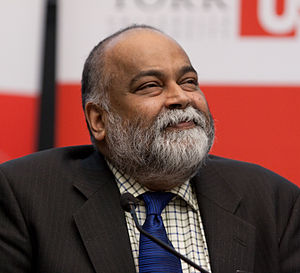Arjun Appadurai

Arjun Appadurai (lahir 1949) adalah antropolog sosial-budaya kontemporer yang diakui sebagai teoriwan utama dalam studi globalisasi. Dalam karya antropologinya, ia membahas pentingnya modernitas negara-bangsa dan globalisasi.[1]
Teori[sunting | sunting sumber]
Dalam buku Disjuncture and Difference in the Global Cultural Economy, Appadurai memaparkan metateori pemisahan (disjungtur). Menurutnya, "ekonomi budaya global yang baru harus dipandang sebagai tatanan yang rumit, tumpang tindih, dan terpisah".[2] Tatanan ini terdiri dari arus budaya global yang beragam, saling terkait, namun terpisah,[3] dan dibagi menjadi lima bagian:
Karya[sunting | sunting sumber]
- 2013 - The Future as Cultural Fact: Essays on the Global Condition. Verso.
- 2012 - Co-editor (with A. Mack) India's World: The Politics of Creativity in a Globalized Society. Rupa&Co.
- 2007 - Worship and Conflict under Colonial Rule: A South Indian Case. Cambridge University Press.
- 2006 - Fear of Small Numbers: An Essay on the Geography of Anger. Durham, NC: Duke University Press.
- 2002 - Globalization (edited volume). Durham, NC: Duke University Press.
- 2001 - Deep democracy: urban governmentality and the horizon of politics. Environment and Urbanization, (Vol. 13 No. 2), pp. 23–43.
- 2001 - La Modernidad Desbordada. (Translation of Modernity At Large) Uruguay and Argentina: Ediciones Trilces and Fondo de Cultura Economica de Argentina.
- 2001 - Apres le Colonialisme: Les Consequences Culturelles de la globalisation. (Translation of Modernity At Large) Paris: Payot.
- 2001 - Modernità in polvere. (Translation of Modernity At Large) Rome: Meltemi Editore.
- 1996 - Modernity At Large: Cultural Dimensions of Globalization. Minneapolis: University of Minnesota Press.
- 1991 - Co-editor (with M. Mills and F. Korom, Eds.), Gender, Genre and Power in South Asian Expressive Traditions. Philadelphia: University of Pennsylvania Press.
- 1988 - Guest Editor, Special Issue of Cultural Anthropology on “Place and Voice in Anthropological Theory” (Vol. 3, No. 1).
- 1988 - "How to Make a National Cuisine: Cookbooks in Contemporary India," Comparative Studies in Society and History (Vol. 31, No. 1): 3-24.
- 1987 - Guest Editor (with Carol A. Breckenridge), Special Annual Issue of The India Magazine (New Delhi) on “Public Culture”.
- 1986 - The Social Life of Things: Commodities in Cultural Perspective (edited volume). New York: Cambridge University Press.
- 1983 - (Reprint). Worship and Conflict Under Colonial Rule: A South Indian Case. New Delhi: Orient Longman.
- 1981 - Worship and Conflict Under Colonial Rule: A South Indian Case. Cambridge: Cambridge University Press.
Lihat pula[sunting | sunting sumber]
Referensi[sunting | sunting sumber]
- ^ Airoots Interviews Arjun Appadurai Diarsipkan 2012-07-22 di Archive.is September 21, 2008.
- ^ "Disjuncture and Difference", Modernity at Large, 32
- ^ Josiah McC. Heyman, Howard Campbell (2009) "The Anthropology of Global Flows:A critical reading of Appadurai's `Disjuncture and Difference in the Global Cultural Economy", Anthropological Theory(9:2) 131-148, 133.
Pranala luar[sunting | sunting sumber]
- Arjun Appadurai's Official Website
- An A-Z of theory: Arjun Appadurai by Andrew Robinson (Ceasefire Magazin, April 22, 2011)
- Fear of Small Numbers by Arjun Appadurai (Duke University Press, 2006)
- Globalization edited by Arjun Appadurai (Duke University Press, 2001)
- Disjuncture and Difference in the Global Cultural Economy (1990), PDF Diarsipkan 2016-03-04 di Wayback Machine.
- Modernity at Large by Arjun Appadurai (University of Minnesota Press, 1996)[pranala nonaktif permanen]
Kategori:
- Akademisi Amerika Serikat
- Kelahiran 1949
- Emigran India ke Amerika Serikat
- Tokoh dari Mumbai
- Antropolog Amerika Serikat
- Alumni Universitas Mumbai
- Alumni Universitas Brandeis
- Alumni Universitas Chicago
- Dosen Universitas Chicago
- Dosen Universitas New York
- Penulis pria Amerika Serikat
- Tokoh Amerika Serikat keturunan India
- Penulis ilmu sosial Amerika Serikat
- Anggota American Academy of Arts and Sciences
- Akademisi Tamil
- Penulis globalisasi
